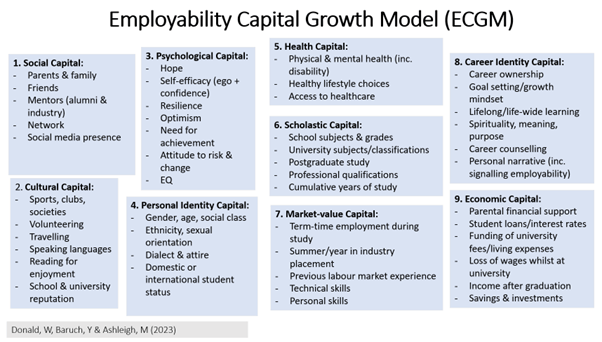How do people build a successful career? Is it just a question of working hard and consistently exceeding your manager’s objectives? If we did live in a simple meritocracy then that would be the case, but experience and lots of research has shown that it’s a lot more complicated than that.
And it’s not just during your career where this is the case, it’s also true for university students as you look to secure, and do well in, work experience, internships, placements and post-uni roles.
The factors that should be considered are called “Capitals”, according to William Donald et al (2023), and are pictured below. That might sound a bit theoretical, but it basically means that you know the “right” people, have done the “right” things, have the “right” attitude, come from the “right” background and have the “right” education and experience. You should also be appropriately healthy, career focussed, and wealthy enough to succeed in your chosen career path.

It’s different for some careers compared to others – the capital needed to be a city lawyer is different to that of a marketing executive, or a film producer, or food entrepreneur – but the important thing to realise is that it’s not just about getting a First Class degree.
Some people are really lucky – they were born into, or brought up in, an environment that means they have the right set of capitals for their desired career. For example, if your parents are teachers, and you want to be a teacher, then you probably have the right social, cultural, personal and career identity capitals already. But if you wanted to be an investment banker, a nurse, or a politician, you’d be likely to fall short.
If you are the first in your family to go to university, or have only just moved to the country, you’d probably have even fewer capitals ready to go.
So what can you do to gain the capital you need to succeed?
1. Try new things, fail at some (or even all) and reflect on how you are growing and developing. It doesn’t matter what it is – part-time work, clubs, sports and societies, volunteering, whatever – as long as it broadens your horizons and stretches your comfort zone.
2. Learn about careers that you know little or nothing about, whether this is by going to panels, talks and careers fairs run by the uni (or externally), or by reading and watching the many cases studies available all over the internet.
3. Build contacts with people in the sectors you are interested in, either at in-person events, or online platforms such as LinkedIn and X.
4. Get support from experts to enhance your performance. Just as elite athletes have coaches to help them improve, you can make use of academic tutors, mentors, disability advisors, careers coaches, placement advisers and many more besides.
Capital growth is baked into UoR careers development
The uni’s degrees are all designed along the same principles, and within our best practice approaches to teaching and learning is a commitment to ensure that all programmes incorporate the development of employability skills, career exploration and insights into working life. This ensures that all students have the chance to develop capital to succeed while they are studying.
Alongside this we run a mentoring scheme (Thrive), an internship programme (RIS) and a programme called Finalist Futures, all of which have been designed to fit into the lives of our students. These are all created to bring equity to capital development, and they are the key activities of our Access and Participation Plan.
The capital you have now is down to luck, but, if it’s not what you need for your future, it isn’t the capital that you are stuck with, you can work on it now that you know it exists.
Graham Philpott, Head of Careers Consultancy
